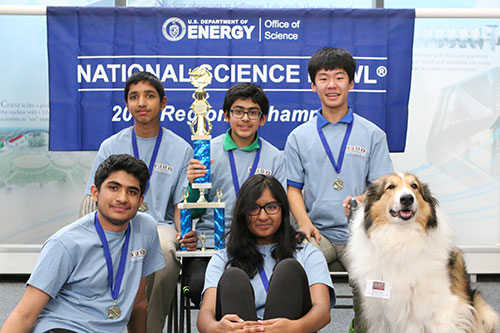Nysmith School for the Gifted, Herndon, finished in first place at the Virginia Regional Middle School Science Bowl. Nysmith will now represent Virginia at the National Science Bowl® (NSB) finals to be held in Washington, D.C., April 28-May 2. Team members (front row, left to right) Ajit Kadeveru, Vaibhav Sharma, and Kaien Yang, and (back row, l.-r.) Anusha Allamsetty and Ishaan Sharma are pictured with their team trophy and Beau Tyler, the Virginia Science Bowl mascot.
Nineteen Teams to Compete in Virginia Regional High School Science Bowl on Feb. 6
NEWPORT NEWS, Va. – Hundreds of students, their team coaches and students’ family members converged on Jefferson Lab on March 5 to participate in the Virginia Regional Middle School Science Bowl.
At the end of the day, Nysmith School for the Gifted, Herndon, finished in first place – moving up from the school’s third place finish at last year’s competition. Nysmith will now represent Virginia at the National Science Bowl® (NSB) finals to be held in Washington, D.C., April 28-May 2.
After a welcome from Jefferson Lab Director Hugh Montgomery in the CEBAF Center auditorium, and a review of the schedule and event rules with the lab’s Science Education Manager, Jan Tyler, the 20 teams spent the morning in a series of fast-paced round robin matches.
In the afternoon, the top eight teams moved on to the double-elimination tournament. While the Nysmith team lost one of its four round-robin matches, it went through the afternoon tournament with no losses and topped Berkeley Middle School, Williamsburg, in the final match of the day with a final score of 100-74. Both teams performed well, but Nysmith edged ahead by providing more correct responses to the 10-point bonus questions. The Nysmith team, coached by Venkata Allamsetty, took home a $750 check for its school science department, a team trophy, individual medals, and the regional banner that the team will carry to nationals.
Finishing in second, the Berkeley Middle School team, coached by Lisa Horrell, took home a $500 check for its school and a team trophy. Trinity Lutheran School, Newport News, coached by Ray Yoh and Cheryl Rowlands, took third place and won a $300 check for its school and a team trophy. And in fourth place, Frost Middle School, Fairfax, coached by Carol Ann Small and Haydee Cooper, took home a team trophy.
Questions covered topics ranging from mathematics and general science to physical science, Earth and space, life science and energy. Question formats included multiple choice and short answer, and the knowledge content got tougher as the matches progressed.
Twelve teams, eliminated from competition after the round robin matches, stayed for the afternoon and participated in an event dubbed the Stay All Day Contest. The teams took part in three activities, each one presenting a different type of design or engineering challenge. Different challenges are presented each year. Individual prizes were presented to each student in the team with the highest combined score for the three activities, as well as to the team members earning the highest score in each individual activity.
Hampton Roads Academy, Newport News, coached by Michelle Miesko and Marvin Hedgepeth, won the Stay All Day Contest with the highest combined score. The team earned a $300 check for its school science department.
At the awards presentations, Jan Tyler congratulated the teams – the students and their coaches. She applauded their hard work and tenacity in preparing for the competition. She also thanked lab management for its support in hosting the event and the nearly 60 volunteers – lab staff, their family members, and friends of the Science Bowl program – who helped conduct the matches and run the event.
The Department of Energy created the National Science Bowl® in 1991 to encourage students to excel in mathematics and science and to pursue careers in these fields. DOE's Office of Science manages the program and sponsors the NSB finals.
Between January and April, several thousand students compete in high school and middle school regional Science Bowl tournaments. Teams of four or five students square off against the opposing team in the fast-paced question-and-answer-style format, where they solve technical problems and answer highly detailed questions in math and many branches of science. Most teams are coached by teachers from the students' schools and spend several months preparing for the regional competitions. Many states have one regional or statewide Science Bowl competition, while larger states, such as California and Texas, hold several regional competitions. The regional tournaments, which host 15-50 teams, are sponsored by federal agencies, national laboratories, institutions of education, and non-profit organizations.
 |
 |
 |
| Finishing in second at the Virginia Regional Middle School Science Bowl, was Berkeley Middle School, Williamsburg. Team members (front row, l.-r.) Julian Curtis-Zilius, Avery Quarles, and Leo Murphy, and (back row, l.-r.) Jack Mingo and Hanna Weiss are pictured with their team trophy and the $500 check for their school science department. | Trinity Lutheran School, Newport News, took third place at the Virginia Regional Middle School Science Bowl on March 5 at Jefferson Lab. Team members (front row, l.-r.) Jim topping, Nate Baker, and Jessie Rose, and (back row, l.-r.) Konrad Krafft, and Jack Wartell are pictured with their team trophy and the $300 check for their school science department. | Frost Middle School, Fairfax, took home a team trophy for their fourth place finish at the Virginia Regional Middle School Science Bowl on March 5. Pictured are team members (front row, l.-r.) Alexandra Cooper, Kevin Davis and Tanvi Breinig, and (back row, l.-r.) Shawn Chen and Jason Xu. |


